“It’s Too Hot on the Page!”: Tony Gilroy, Sharon Horgan and the THR Showrunner Roundtable
- Oops!Something went wrong.Please try again later.
- Oops!Something went wrong.Please try again later.
- Oops!Something went wrong.Please try again later.

For the six top writer-producers who gathered over Zoom in late April for THR‘s Showrunner Roundtable, the idea of a potential WGA strike was spoken of like an inevitability. And it was. With pens down since May 1, each participant has been out of work — including Tony Gilroy, who stepped away from season two of his pricey Star Wars series, Andor. But his deal to make that season, without a piece of the proverbial pie, is one of the reasons he supported a strike. “All I’ve ever wanted is to walk into the casino that I grew up in and bet on myself,” said Gilroy, to nods of agreement from Taffy Brodesser-Akner (Fleishman Is in Trouble), Ryan Condal (House of the Dragon), Katori Hall (P-Valley), Sharon Horgan (Bad Sisters) and Ashley Lyle (Yellowjackets) at mention of the disappearing ownership stake. “Because, right now, I’m either being wildly overpaid or wildly underpaid.”
What’s the last creative choice that scared the hell out of you or your partners? Ashley might be a good place to start, considering how prominently cannibalism plays into Yellowjackets.
More from The Hollywood Reporter
Critics' Conversation: Despite Heartening Inclusions, Emmy Voters Struggle to Broaden Their Horizons
Sheryl Lee Ralph on Emmy Nom and Potential SAG-AFTRA Strike: "We're Fighting for Our Art"
ASHLEY LYLE Actually, it wasn’t the cannibalism! We felt weirdly confident about that. This season was scary because we’d thought we would float under the radar with season one. So, it was about leaning into more of the stuff that we really are drawn to: the adult storyline. The [flashback] wilderness storyline has just built-in life-or-death stakes, so it would’ve been really easy to just completely put our attention there. So it scared us to spend as much time as we do with the adults. But that, to us, is what the show is about.
KATORI HALL Setting the second season during the pandemic, the network was scared, studio was scared, everybody. “People are going to be so tired of anything pandemic-related by the time it airs.” But I felt like it was my responsibility to tell a part of the many stories about the pandemic. We’re set in a strip club, and our focus is marginalized communities — Black women — and oftentimes stories of those people are not told well or correctly. We were using fiction in order to tell the truth. Even when it dropped, our audience was like, “Ah, shit, we got to sit through a stripper with a mask?” (Laughs.)
SHARON HORGAN I killed a cat, and I’ve never had so many complaints about anything. They really don’t like it when you hurt animals. People? Fine. Children, even! But animals? No.
Sharon, you killed a cat and a dog in Bad Sisters.
HORGAN I did kill a dog as well, you’re right. But there’s just something about cats. Do you remember Peep Show, Jesse Armstrong’s show way before Succession? He had his characters kill and eat a dog, so I knew you could get away with certain things with dogs.
LYLE We’d beheaded a dog. Boy, did people not enjoy that. We also killed a rabbit in the pilot. We did the traditional testing where everybody had their knobs and it went off a cliff when [Melanie Lynskey’s character] killed that rabbit, let me tell you.
TAFFY BRODESSER-AKNER Did you warn them that they were eventually going to eat one of their friends?
LYLE Exactly!
BRODESSER-AKNER I’m so afraid to move on from things that seem to be working, but we decided not to do a second season. We went back and forth because I can beat anything to death. I could do a second season of this Zoom! But there’s also knowing that you’ve made your point, which we had. It’s a book. It’s not going to have a sequel as a book. I don’t know if it was for the best, and sometimes I wake up with an idea for a second season.
RYAN CONDAL When you’re adapting a book with a rather passionate fan base, every decision can feel fairly loaded. Fire & Blood, [George R.R. Martin’s] book that House of the Dragon is based on, it’s this fake history that’s told from three different points of view. So, we do have to invent a lot. George is part of the show, but it’s challenging to make decisions that service the narrative and this very expensive TV show. Somebody somewhere is going to hate this, but we’re doing it anyway.
TONY GILROY I have a variety of audiences that were here before I was. They have subcultures within their own subcultures. But if you look at Star Wars as the Catholic Church, our mandate was to take the Latin Mass out completely. Turn it upside down. But every single thing that we do is canonical, and it has a whole bunch of filters of analysis that are unlike anything else I’ve ever worked on. I guess the most shocking thing for my collaborators — everybody I work with — is waiting for every new draft to see how many more characters we’re going to have. We just have so many characters. I can’t stop.
Tony, you’ve referred to Star Wars as “a host organism for anything,” but that’s a franchise where some filmmakers have really struggled to align their vision with that of Lucasfilm. By many accounts, you had more freedom than most. What are the blessings and curses that accompany that freedom?
GILROY Well, the curse is the pressure. Some of these shows are aircraft carriers. They’re pyramids. The multiples of expense and the amount of people working means the pressure is enormous. But it was going to represent a really large part of my life. So I wasn’t going to change my game. Everybody kind of knows what I do and what I want to do and that I like a great deal of independence. But I like to deliver for people. There was a pretty healthy understanding that if we were going to go the way that I said we wanted to go, we were going to be pretty disruptive about what we were doing. I didn’t have to worry after that.
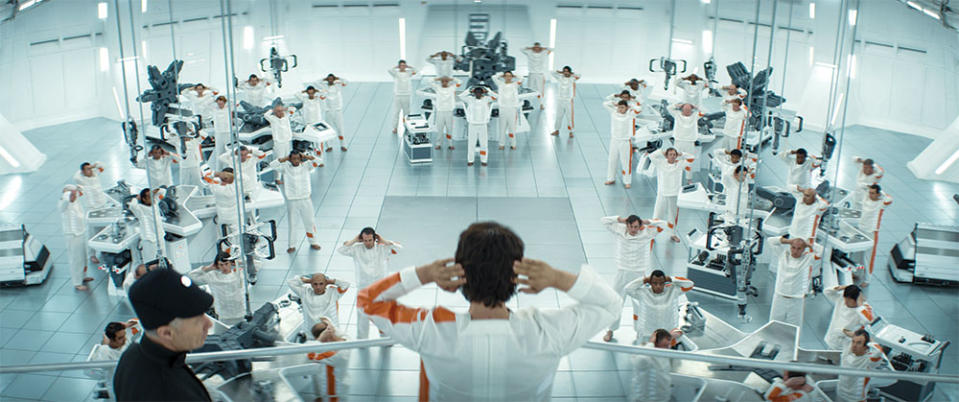
How good are all of you at gauging how something will land with an audience — and when was the last time you were way off?
HORGAN In the U.K., you don’t really do testing. There are so many stages along the way where you can mess it up. When Rob [Delaney] and I did Catastrophe, we had a strong feeling it was going to go OK. We did a screening at the Edinburgh TV Festival that went pretty well. But, still, you don’t know whether that’s a microcosm of an audience. Bad Sisters is about four women chasing a man around Ireland, trying to kill him, while at the same time there’s a heavy domestic abuse storyline. We didn’t know if people would feel like we were making light of it. But I’m always surprised at what people like, just in general.
BRODESSER-AKNER I was very unsteady on the amount of voiceover we could use, and I was told that very little could be tolerated. People showed me Goodfellas, which is a movie I think of as voiceover-heavy, and it’s maybe 20 lines or something. That freaked me out. Then we had this idea that we could take the voiceover out, and I was surprised how well it worked. I couldn’t believe that I abandoned so much of it. I wanted things to be acted.
Taffy, I’ve heard you say that there was not one person with less experience than you on the set of Fleishman. What impact does that awareness have on your process of making a show?
BRODESSER-AKNER When I say there was not one person, I mean that the PAs were teaching me basic vocabulary. And, as a journalist, I couldn’t believe there was someone there to bring you water. Guys, what a gig! That’s what I told my journalist friends when I came back. “What was it like?” There is a chair with your name on it and somebody will bring you water! It’s kind of all I ever wanted. The impact? This is what I believe. As a journalist who is fairly good at observing people around me, I believe that my lack of experience slowed us down a little bit — mostly in post as I debated things, and on set a little bit. In my first scripts, I had 150 scenes. People would say, “Oh, this is a big script.” I would say “thank you,” because there are so many euphemisms in Hollywood. When I realized that every time you change a scene, someone has to change the clothing, makeup, hair and lighting — that this entire ocean liner has to move — I stopped doing that nearly immediately.
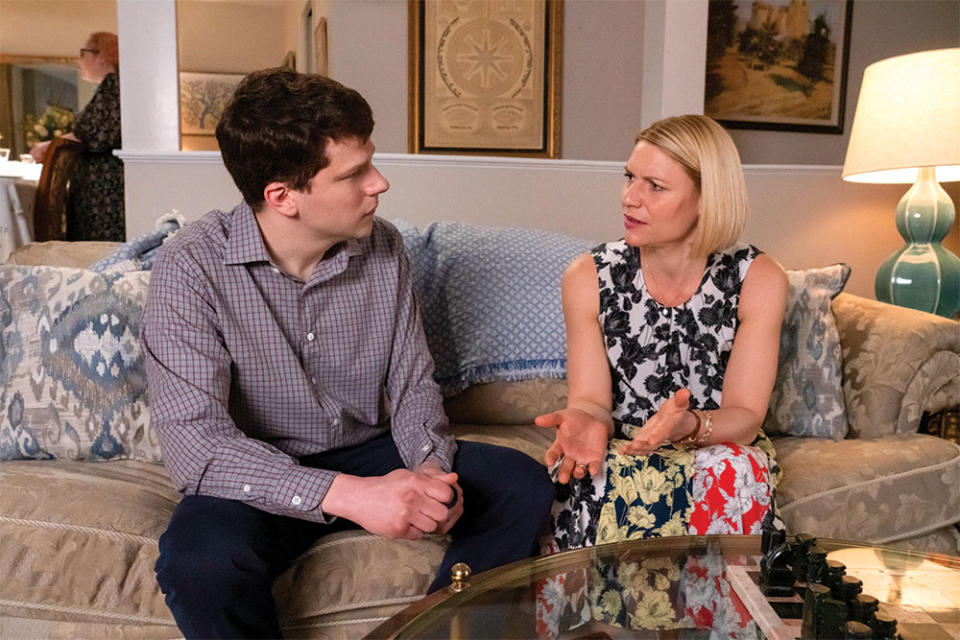
Katori, you won a Pulitzer and were nominated for a Tony since starting P-Valley. What doors have opened and what doors are you still waiting on to open?
HALL I think [it opened] the door of confidence in myself. Because of the type of work that I do, I have really had to prove myself — prove that I deserve to sit at the table, prove that my work even deserved to be produced. So, to be sitting on my set now and just have that type of validation, that type of sparkle, it makes it easier for other people to trust me. So, it allows me to ask for things that people would automatically say no to. More money.
Sharon, you’ve said that you don’t consider the fact that you’re going to act out your own material while you write it. How does that sort of detachment make for better results for you?
HORGAN I’m often taken by surprise on my first day on set as an actor when I realize I haven’t fully thought through that I’m going to be doing those things — especially when I’ve written myself a sex scene. I’m like, “Oh, for God’s sake.” I’m writing at the moment, handing in some scripts, and I’ve had it pointed out that my character was in it very little. Her story is the least developed. I’m sure that’s because I’m also thinking about what the other actors are going to think when these scripts land on their desk. I want them to be happy and to feel like their characters have storylines that are meaty and well thought out. So, sometimes I think about my character last. You can’t sit in an edit and be self-conscious about yourself. You end up thinking about stupid things like how fat you look. Or your skin. It can trip me up.
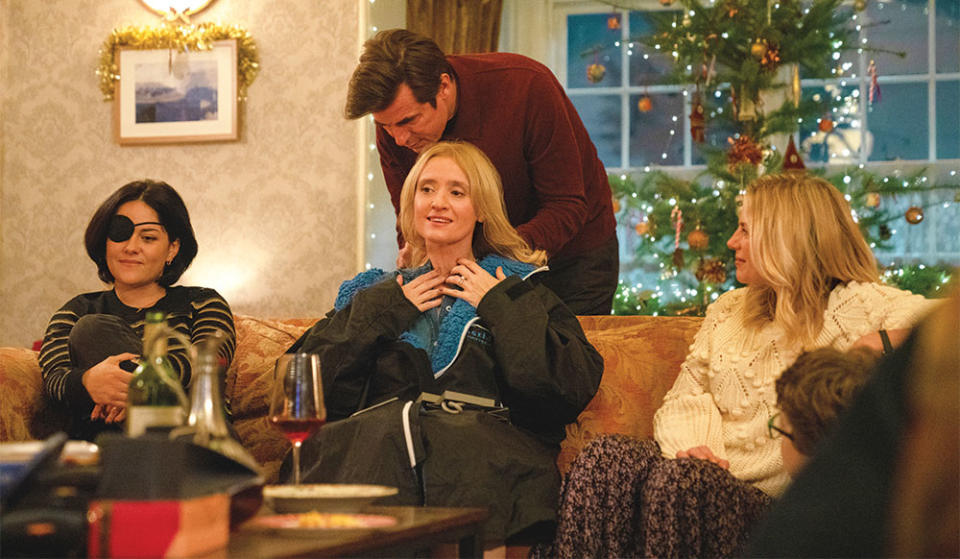
How much do the rest of you think about what the actors will have to execute when you’re writing?
HALL I think a lot about what the actors have to do, just because of the amount of nudity and intimacy that’s required. Sex scenes are hard.
HORGAN So hard.
HALL Because our show is set in the world of sex work, there are certain requirements if we’re going to portray the world authentically and do these characters justice. I’ll often ping an actor and say, “Hey, you’re going to have five sex scenes this season. Are you OK with that?” I’m fiercely transparent with them because they are using their skin, their bodies, to tell this story. It has to be a partnership. And sometimes, somebody will be like, “Katori … ” And I’m like, “I got you.”
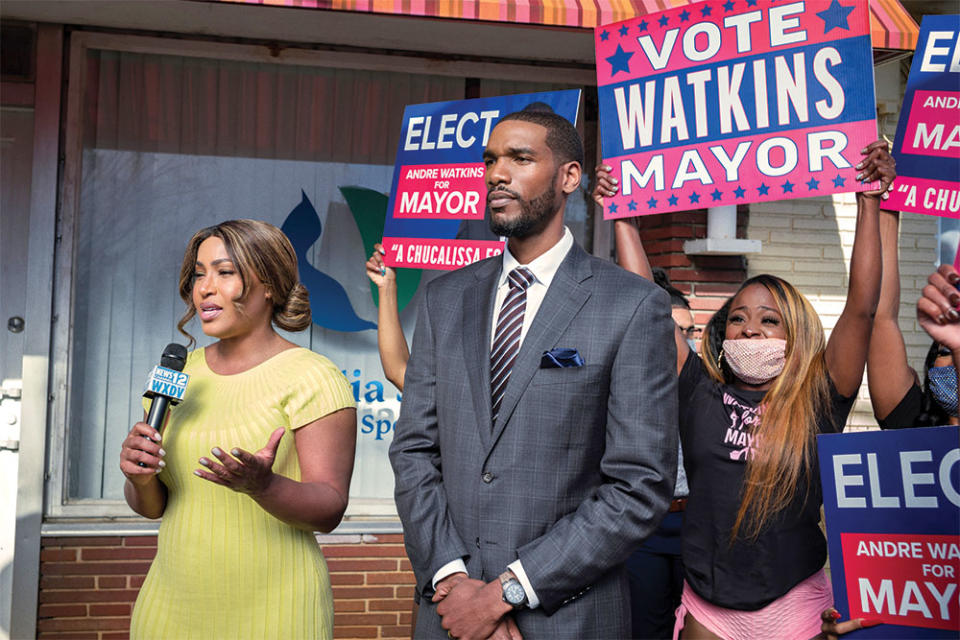
Ashley, you put your cast through a lot. What’s the most difficult conversation you had with an actor this season?
LYLE We don’t have a lot of difficult conversations, but Shauna [Sophie Nélisse] going into labor was a really intense episode [the character delivers a stillborn child]. There was no nudity or sex scenes in this episode, but we had our intimacy coordinator there because of the sensitivity of the subject matter and the intensity of the emotion on set. It wasn’t a specific conversation with a specific actor that was difficult. We just knew that we were asking a lot of our actors and wanted everyone to feel comfortable so that they could do their best work. With the cannibalism, it’s a lot of joking. They filled the corpse with jackfruit. The character’s named Jackie. They called it Jackie fruit.
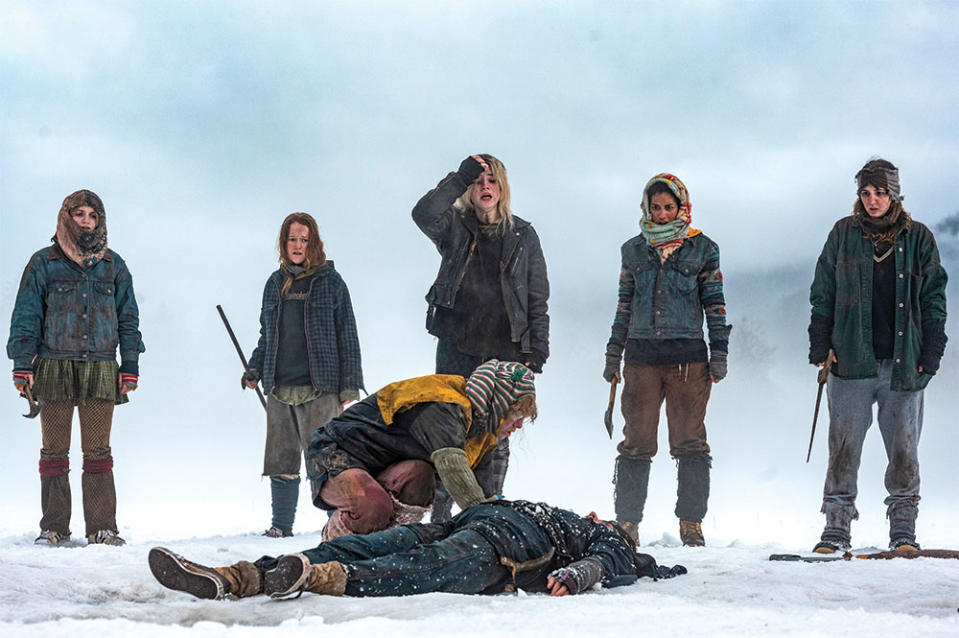
I don’t think many people consider intimacy coordinators outside the context of a sex scene. Taffy, did you have one for Claire Danes’ rather traumatic labor scene?
BRODESSER-AKNER Claire’s best friend is a therapist, and she relied on her for that kind of stuff. But Claire is kind of otherworldly. She did not need that much help. She laughed on set. We got everything in one take. The attention was being given to me, crying in a corner. But we had an incredible intimacy coordinator. [For Claire,] I think it was a discussion but not a negotiation. The nudity and the masturbation, however … We had a montage of Jesse Eisenberg having sex with nine different people. That was the Geneva Convention.
Ryan, is there anything you feel more emboldened to do in season two now that the show’s a success?
CONDAL I mean, we replaced almost the entire cast in the sixth episode. The second season will be more of the rhythms of storytelling in Game of Thrones that people are used to: multiple points of view, this person’s over here, that person’s over there. There are obviously big story moves and twists to come, but I feel like oddly the bold move — which was something that George insisted upon from the beginning — is that we had to cover 20 years of history to get people to where these women start the story, have children of their own who have now grown up to be at least of fighting or dragon-riding age. That was the big ask of the audience. We figured if we could get through season one and get people to watch, we would have them. Now it’s a thing. People are paying attention.
Does your show bible clarify what dragon-riding age is?
BRODESSER-AKNER Varies by state, right?
CONDAL That’s a better joke than I could possibly make. Thank you.
BRODESSER-AKNER I’m looking for my next job.
CONDAL Come on over. No, it’s unspecific. Apparently the youngest dragon rider ever was 8. I have a 7½-year-old, and I don’t trust her to cross the street on her own.
HORGAN Different times!
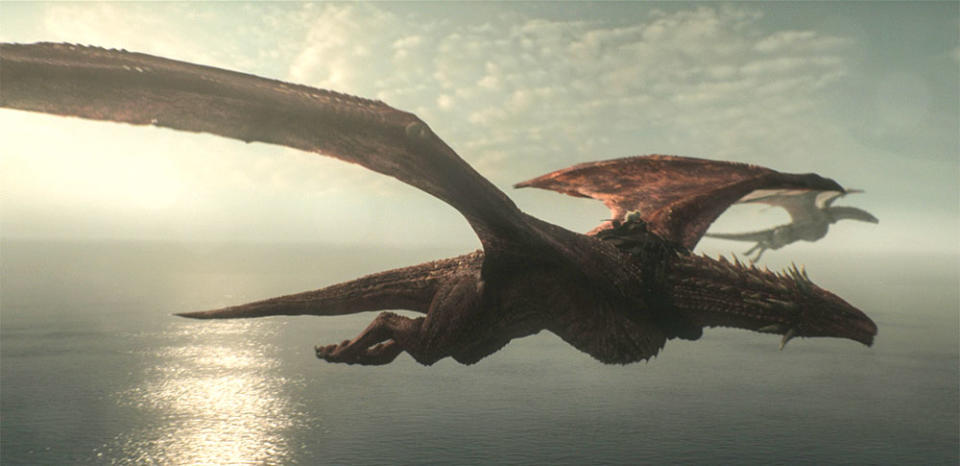
Tony, the Star Wars fandom is very specific. It’s enthusiastic at its best and quite toxic at its worst. Does that weigh on you while you’re making Andor — and how did you choose to engage with the inevitable feedback?
GILROY I had been on Rogue One, and that was a very clinical kind of experience. [The feedback] wasn’t unknown to me, but man, I just ignored it. Just absolute flat out ignored it. And that’ll go out as a pull quote! That one comment will generate 90 million Reddit [posts]. And I’m certainly not being dismissive of it. But by the time I finish this, I’ll have been responsible for 26 hours of Star Wars canon. That puts me in a pretty small group. I respect it. We just went and did the Star Wars Celebration in London two weeks ago, and it’s really a pleasure to say to them, with all honesty, that they’re investors in our show. It’s their mad passion that forms the basic motor that gave Disney the economic guts to gamble on something as bizarrely different as what we did. So I pay attention to it. I know a great deal about a five-year period in Star Wars canonical history. And I won’t embarrass myself and describe how little I know about the rest of it. It would be criminal if I didn’t have great affection for the environment that I’m playing in for five years. It would be a crime against nature to take five years of your creative life and not really believe in the thing you’re doing.
Both Tony and Ryan are playing in big, expensive sandboxes. Anyone else have franchise dreams?
GILROY Don’t do it. (Laughs.) Ryan’s going to tell you the same thing. (Condal shakes head.) Don’t do what we’re doing.
HORGAN I think it’s great to come out of your comfort zone whenever you can. Before Bad Sisters, I’d only ever written half-hour sitcoms. Bad Sisters is an hourlong drama and also an adaptation. It’s exciting to put yourself into something that you know nothing about and just learn something new. Yeah, I’ll take the meeting.
BRODESSER-AKNER I feel like the way fandom has changed over the years makes this an even harder question. Fandom is not something that is a debate anymore. It is now this immutable thing that does not allow for dissent. I wonder if you do need somebody, like Sharon, like Ryan or definitely like Tony, whose long, nuanced answer is going to be reduced to, “I ignore it!” (Laughs.)
HORGAN I felt nervous!
BRODESSER-AKNER I was on a Writers Guild panel with Tony, and some very young person asked us a question about nihilism, like, “Why should I write if nothing matters anymore?” And Tony was saying, “How could you say nothing matters?” Then the next day, the quote on Deadline was like, “Nothing Matters! Tony Gilroy on the impending strike.” It was insane.
GILROY It wasn’t great.
BRODESSER-AKNER I don’t know how you can do right by these fans. But the stage that I’m at — which is not the stage that anyone else is here — I don’t want to be the first or 17th writer on something. Like, all right, I’ll do the My Little Pony movie. Then something crazy happens where eventually My Little Pony gets too big, and they bring in Tony to rewrite me after 40 other writers because of the testing. So, I would just like to do these little things that seem big to me but do not seem big to other people.
CONDAL I’ll do the My Little Pony movie. That’s your pull quote.
Ryan, you said stay away from big IP, but here you are producing yet another Game of Thrones spinoff. What made you say yes?
CONDAL I mean, I love this. It’s why I got into writing. I like nutritious popcorn. It’s always been the thing that I’ve chased. I love all the shows on this panel, but I don’t think of myself as capable of writing most of them. I like working in a world where there is a sense of escapism and myth-making because it allows you to explore timeless themes. Getting to play in the Game of Thrones sandbox — even though there is this enormous, passionate fan base that’s very specific about what they expect and what they want — it’s exciting. That’s why I agreed to do the second one, and I’m really just helping out as somebody that has done this before.
What’s the most worrying conversation that one of you has had with an executive this year?
HALL It hasn’t been the easiest road to where I sit, as this Black female showrunner telling the types of stories [I am] in this very unapologetic way. A worrying conversation that has popped up over time is just how honest to be on the page. There was this one scene from last season where we were extremely explicit on the page when it came to which sexual positions needed to be done, because the sexual position was articulating how the character was expressing their sexual identity. And so I remember a conversation coming up of like, “Do you need to be so explicit on the page? Can’t you just allow the actors to figure it out?” “No, no, no, no, no, no, no, we can’t do that!” We literally had to go from point A to point Z on the page because we wanted the actors to be so clear about where their bodies needed to go. That flustered people. It was like, “It’s too hot on the page! It’s too hot on the page!” Can we just turn it down or use more vague language? Once that conversation happened, they understood where I was coming from. And it makes it safer for everybody to know exactly what they need to do. Plus, you can have five meetings about intimacy instead of 20.
“Too hot on the page,” that’s our pull quote. We need to wrap things up — but, by the time people see this, we’ll have avoided a strike, endured a strike or still be in the midst of a strike. What’s an issue facing writers that’s not going to get settled this time around but still drives you crazy?
LYLE Everything is in flux right now. And we’ve been very lucky at Showtime. They’ve given us a lot of creative latitude, but the ground has been shifting under their feet as well. For the longest time, for better or for worse, people make jokes about notes from executives. I’ve worked with a lot of executives who do this because they care about making television. And now their bosses’ bosses’ bosses’ have become focused on the bottom line. The actual concern with telling stories — which is I think why we all do this — has been superimposed by a desire to make shareholders happy. Obviously, this has always been the cross section of art and commerce. It is a business. But it’s worrisome to not only us but to the people we work with on the business side of things, how much focus has been pulled from telling original or interesting stories. It’s all about just what Wall Street is valuing right now. That is not going to get settled in this strike.
GILROY I find it incredibly ironic that at the moment where every single conceivable use of your material is being analyzed, parsed, interpreted, twisted and molded together, that’s the moment where we’ve finally arrived at the company saying, “We’re never going to give you any ownership anymore. This is all going to be about buyouts.” I had to negotiate a deal to come back with the second season, and I [couldn’t] do something that I’ve been able to do for 35 years in my career — which is be able to walk into a casino and say, “Hey, I want to bet on myself. I’ll take less. Give me a piece.” I want a metric that shows me if I win, I win. And we’re all being forced into that position because of this crippled new system that I don’t think the companies are entirely happy with, either. This is a universal problem. I can never accurately be paid for what I’m doing right now. Either it’s a huge loss for Disney and I rip them off, or I’m being fucking screwed upside down. I’m afraid that’ll be memorialized if it goes another three years without being addressed. That’s my fear.
HALL Not only does the economic model need to be fixed, the cultural model [needs to be fixed]. If the entertainment industry really wants to push toward actual diversity, do we need to do a Rooney Rule [an NFL policy that requires teams to interview diverse candidates for coaching and other positions]? I don’t know. We’re so deeply entrenched in this system of not having enough people of color or women or queer folk in greenlighting positions. In this boom of streaming, there have been a lot of underrepresented voices that have gotten an opportunity to have their own shows — showrun their own shows. We need to make sure that we’re not leaving behind all these people who have been given opportunities in this boom of streaming. My fear with a strike is that things are going to contract. They’re going to say, “Oh, well, if we’ve got to pay you more, we’re going to make less.” That opportunity for folks of color is going to vanish. How are we going to set up those voices that broke through for success once we get to the other side of this?
Interview edited for length and clarity.
This story first appeared in a June stand-alone issue of The Hollywood Reporter magazine. To receive the magazine, click here to subscribe.
Best of The Hollywood Reporter
"This Was One Hot Mess": Lisa Vanderpump, Keke Palmer and the THR Reality Roundtable
Tom Holland Breaks Free: Talking Zendaya, ‘The Crowded Room’ and the Future of Spider-Man

